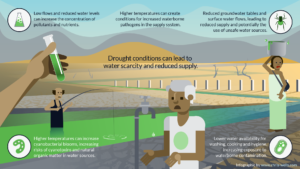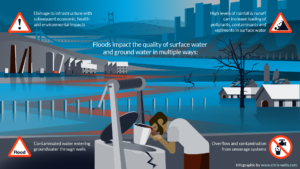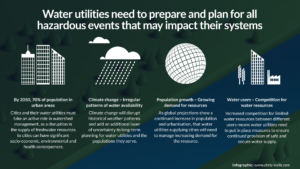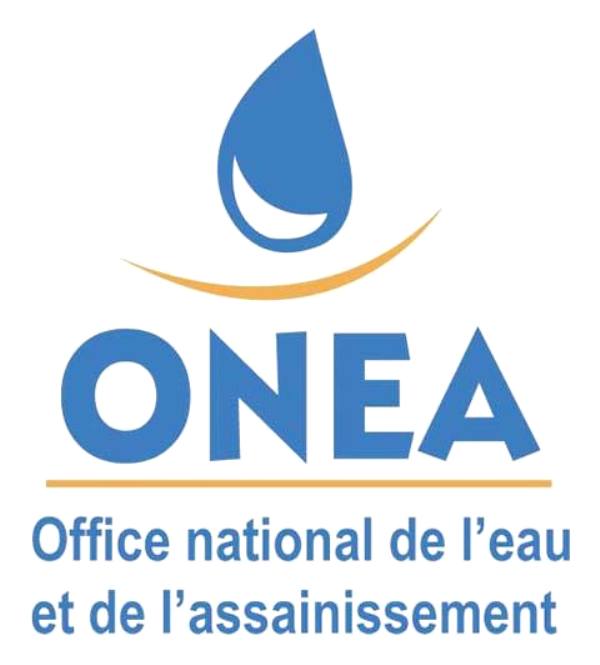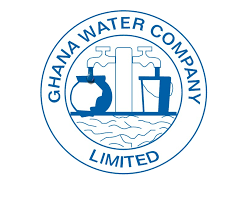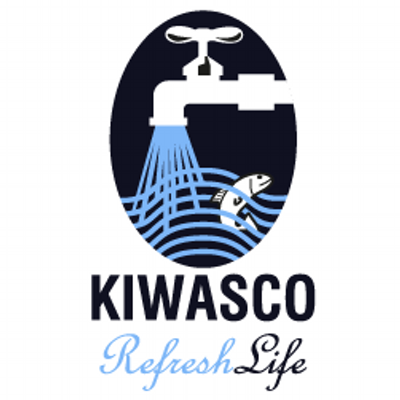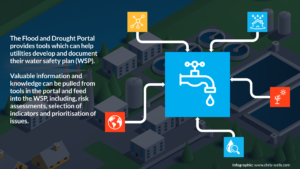Water Safety Plans: a robust framework for water utilities to adapt to climate change
How climate change is affecting water utilities
Climate change is altering the hydrological cycle and hence, changing the timing and intensity of rainfall, directly affecting the quantity and quality of water resources for different users. Climatic and environmental issues such as floods, droughts, increased temperature and rising sea level risks as a result of the change in hydrological cycle have a clear impact on a water utility’s capacity to sustain water service provision and the economic viability and cost-effectiveness of treatment and distribution. There is a growing sense of urgency for utilities to build resilience towards weather extremities such as floods and droughts as an integral part of the water supply management
About Water Safety Planning (WSPs)
Water Safety Planning (WSP) is a comprehensive risk assessment and risk management approach that encompasses all steps and stakeholders of the water supply system from catchment to consumer. The World Health Organisation cites WSPs as an effective means of consistently ensuring the safety and acceptability of a drinking-water supply. Successful implementation of WSPs can improve drinking water quality, accrue operational efficiencies and provide a robust framework to better target more sustainable long-term capital investments. Since 2011, WA has coordinated projects with its members to support the implementation of WSPs in various countries in Africa including: Burkina Faso, Ghana, Guinea, Kenya, Liberia, Morocco, Senegal, Sierra Leone, South Africa, Tanzania and Uganda.
WHO and IWA are working together to promote WSPs, learn more on the WSPortal
IWA also has a specialist group on WSP to disseminate practical knowledge in WSP implementation to key stakeholders involved in delivering safe drinking water.
What is Climate Resilient WSPs
Climate Resilient WSPs provides a simple robust framework for water utilities to make climate resilience assessments and to plan for progressive adaptation to climate change and current challenges, such as changing input parameters, in fulfilling their provision as a water service provider.
Through support from the OPEC Fund for International Development (OFID), IWA is working on a project “Climate Resilient Water Safety Planning to Improve Water Supply and Public Health”. The project is addressing how utilities through WSP can better prepare and respond to extreme weather events; as well as undertaking strategic awareness approaches to involve key ministries in supporting the institutionalization of WSP within countries.
Implementation countries
The selected countries for projects are:
Objectives, Activities and Tools
Objectives of Project
The project has three main objectives:
- To build capacity to enable effective and sustainable WSP implementation
- To integrate climate resilience into water safety planning for better preparedness and response to extreme climatic events
- To increase awareness of WSP benefits in securing public health, water security and resilience to extreme events
Key Activities
The main activities in this project include:
- Refinement of online tools, specifically the WSP tool, to support planning within transboundary basins
- WSP Training
- WSP development and implementation
- Sensitization and awareness workshops
Supporting Tools
The Flood and Drought portal developed as part of the Flood and Drought Management Tools project provides access to a number of applications to support decision makers at basin and local level. The Portal tools can help water utilities develop and document their WSP while also integrating climate change considerations in the process. More information about the applications can be found here.
News and Events
25 February -1 March 2019,
WSP Training, Kisumu, Kenya.
18 March-22 March
WSP Training, GWCL, Ghana
08 April-12 April 2019
WSP Training, ONEA, Burkina Faso
15 April-19 April 2019
WSP Training, SDE, Senegal
